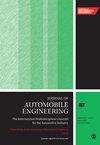Cooperative adaptive cruise control system with improved variable spacing strategy
IF 1.5
4区 工程技术
Q3 ENGINEERING, MECHANICAL
Proceedings of the Institution of Mechanical Engineers Part D-Journal of Automobile Engineering
Pub Date : 2024-08-24
DOI:10.1177/09544070241271830
引用次数: 0
Abstract
To further improve the safety, tracking, comfort, fuel economy, and platoon fluctuation of the cooperative adaptive cruise control (CACC) system, and alleviate traffic congestion, an improved model predictive control (MPC) algorithm considering multi-objective optimization is designed. An error compensation prediction constant time headway spacing strategy considering relative velocity, relative acceleration, and preceding vehicle distance error is proposed. The spacing strategy is introduced into the prediction model of MPC to optimize the prediction accuracy, improve the response-ability of the rear vehicle to the change of the lead state, and better coordinate the conflicting multiple objectives. The asymptotic stability of the CACC system under the improved MPC algorithm is proved by the Lyapunov stability theory, and the evaluation index is established to quantify the comprehensive performance of the CACC system. The numerical simulation is carried out under rapid acceleration and deceleration conditions, and the results show that the improved model predictive control algorithm can improve the safety, tracking, comfort, fuel economy, and road capacity of the CACC system. To simulate real traffic scenarios, co-simulation is carried out under the Worldwide Harmonized Light Vehicles Test Cycle (WLTC) condition, which further verifies the rationality and effectiveness of the algorithm.采用改进型可变间距策略的协同自适应巡航控制系统
为进一步提高协同自适应巡航控制系统(CACC)的安全性、跟踪性、舒适性、燃油经济性和排量波动性,缓解交通拥堵,设计了一种考虑多目标优化的改进型模型预测控制(MPC)算法。提出了一种考虑相对速度、相对加速度和前车距离误差的误差补偿预测恒定时间车头间距策略。该间隔策略被引入 MPC 预测模型,以优化预测精度,提高后车对前车状态变化的响应能力,并更好地协调相互冲突的多目标。利用李雅普诺夫稳定性理论证明了改进 MPC 算法下 CACC 系统的渐近稳定性,并建立了评价指标来量化 CACC 系统的综合性能。在急加速和急减速条件下进行了数值仿真,结果表明改进的模型预测控制算法可以提高 CACC 系统的安全性、跟踪性、舒适性、燃油经济性和道路通行能力。为模拟真实交通场景,在全球统一轻型车辆测试循环(WLTC)条件下进行了协同仿真,进一步验证了算法的合理性和有效性。
本文章由计算机程序翻译,如有差异,请以英文原文为准。
求助全文
约1分钟内获得全文
求助全文
来源期刊

CiteScore
4.40
自引率
17.60%
发文量
263
审稿时长
3.5 months
期刊介绍:
The Journal of Automobile Engineering is an established, high quality multi-disciplinary journal which publishes the very best peer-reviewed science and engineering in the field.
 求助内容:
求助内容: 应助结果提醒方式:
应助结果提醒方式:


